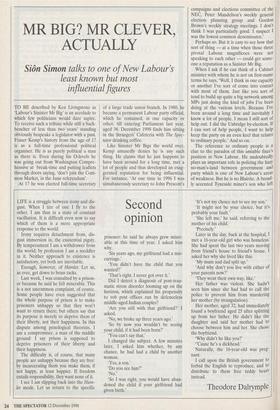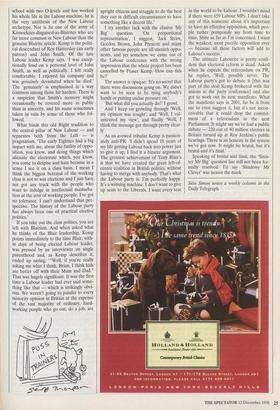MR BIG? MR CLEVER, ACTUALLY
Sion Simon talks to one of New Labour's
least known but most influential figures
TO BE described by Ken Livingstone as `Labour's Sinister Mr Big' is an accolade to which few politicians would dare aspire. To receive such a tribute while still a back- bencher of less than two years' standing obviously bespeaks a legislator with a past. Fraser Kemp's history from the age of 17 is as a full-time professional political organiser. He is as purely political a man as there is. Even during his 0-levels he was going out from Washington Compre- hensive at break-time and putting leaflets through doors saying, 'don't join the Com- mon Market, in the June referendum'.
At 17 he was elected full-time secretary of a large trade union branch. In 1980, he became a permanent Labour party official, which he remained, in one capacity or other, till entering Parliament last year, aged 38. December 1998 finds him sitting in the Strangers' Cafeteria with The Spec- tator drinking coffee.
Like Sinister Mr Bigs the world over, Kemp amusedly denies he is any such thing. He claims that he just happens to have been around for a long time, met a lot of people and thus developed an exag- gerated reputation for being influential. For instance, 'At one time in 1996 I was simultaneously secretary to John Prescott's campaigns and elections committee of the NEC, Peter Mandelson's weekly general election planning group and Gordon Brown's weekly strategy meetings. I don't think I was particularly good. I suspect I was the lowest common denominator.'
Perhaps so. But it is easy to see how that sort of thing — at a time when those three pivotal Labour magnificoes were not speaking to each other — could get some- one a reputation as a Sinister Mr Big.
When I ask if he can think of a Cabinet minister with whom he is not on first-name terms he says, 'Well, I think in one capacity or another I've sort of come into contact with most of them. Just like you sort of tend to build up quite a big network among MPs just doing the kind of jobs I've been doing at the various levels. Because I've been around a long time and inevitably I know a lot of people, I mean I still sort of help out. I did the Uxbridge by-election. If I can sort of help people, I want to help keep the party on an even keel that relates to ordinary people.' And so on.
The reference to ordinary people is a clue to the paradox of this amiable fixer's position in New Labour. He undoubtedly plays an important role in policing the hazy no-man's-land between government and party which is one of New Labour's areas of weakness. But he is no Blairite. A broad- ly accented Tyneside miner's son who left school with two 0-levels and has worked his whole life in the Labour machine, he is the very antithesis of the New Labour archetype. Nor is he one of the army of Kinnockites-disguised-as-Blairites who are far more common in New Labour than the genuine Blairite article. Kemp is the politi- cal descendant of Roy Hattersley (an early patron) and John Smith. Of the late Labour leader Kemp says, 'I was excep- tionally fond on a personal level of John Smith, as well as politically. I felt really comfortable. I enjoyed his company and was genuinely devastated when he died.' The 'genuinely' is emphasised in a way common among those hit hardest. There is a suspicion that Smith's memory might occasionally be revered more in public than in sincerity, and his name sometimes taken in vain by some of those who fol- lowed.
What binds this old Right tradition to the central pillar of New Labour — and separates both from the Left — is pragmatism. 'The early Eighties had a big impact with me, about the futility of oppo- sition, you know, and doing things which alienate the electorate which, you know, you come to despise and hate because in a sense I see it on a class basis. I mean I think the biggest betrayal of the working class is not to win elections and I just have not got any truck with the people who want to indulge in intellectual masturba- tion at the cost of working people. I've got no tolerance. I can't understand that per- spective. The history of the Labour party has always been one of practical elective politics.'
If you take out the class politics, you are left with Blairism. And when asked what he thinks of the Blair leadership, Kemp points immediately to the time Blair, with- in days of being elected Labour leader, was pressed by an interviewer on single parenthood and, as Kemp describes it, ended up saying, "'Well, if you're really asking me what I think, Brian, I think kids are better off with their Mum and Dad." That was hugely significant. It was the first time a Labour leader had ever said some- thing like that — which is strikingly obvi- ous. We weren't going to pander to every minority opinion in Britain at the expense of the vast majority of ordinary, hard- working people who go out, do a job, are upright citizens and struggle to do the best they can in difficult circumstances to have something like a decent life.'
I try another tack with the elusive `Mr Big' question. 'On proportional representation', I suggest, 'Jack Straw, Gordon Brown, John Prescott and many other famous people are all staunch oppo- nents, and yet somehow we came out of the Labour conference with the strong impression that the whole project has been cancelled by Fraser Kemp. How can this be?'
The answer is opaque: 'It's no secret that there were discussions going on. We didn't want to be seen to be tying anybody's hands or putting undue pressure on.'
`But what did you actually do?' I growl.
And I keep on growling through 'Well, my opinion was sought', and 'Well, I vol- unteered my view', and finally 'Well, I think the message got through pretty clear- ly'.
As an avowed tribalist Kemp is passion- ately anti-PR. 'I didn't spend 18 years of my life getting Labour back into power just to give it up. I find it a bizarre argument. The greatest achievement of Tony Blair's is that we have created the great left-of- centre coalition in British politics, without having to merge with anybody. That's what the Labour party is. I'm perfectly happy. It's a winning machine. I don't want to give up seats to the Liberals. I want every seat in the world to be Labour. I wouldn't mind if there were 659 Labour MPs. I don't take any of this nonsense about it's important to have an effective opposition, which peo- ple rather pompously say from time to time. Shite as far as I'm concerned. I want the weakest, most puerile opposition ever — because all these factors will add to Labour's success.'
The ultimate Labourite is pretty confi- dent that electoral reform is dead. Asked when he expects the referendum on PR, he replies, 'Well, possibly never. The Labour party's got to debate it [this was part of the deal Kemp brokered with the unions at the party conference] and also got to work out its next manifesto. What the manifesto says in 2001, far be it from me to even suggest it, but it's not incon- ceivable that it could drop the commit- ment of a referendum in the next Parliament. It might say we've had a public debate — 220 out of 40 million electors in Britain turned up at Roy Jenkins's public hearings. There is an honesty in the system we've got now. It might be brutal, but it's brutal and it's final.'
Speaking of brutal and final, the 'Sinis- ter Mr Big' question has still not been for- mally resolved. I'd say 'Shadowy Mr Clever' was nearer the mark.
Sion Simon writes a weekly column in the Daily Telegraph.











































































 Previous page
Previous page